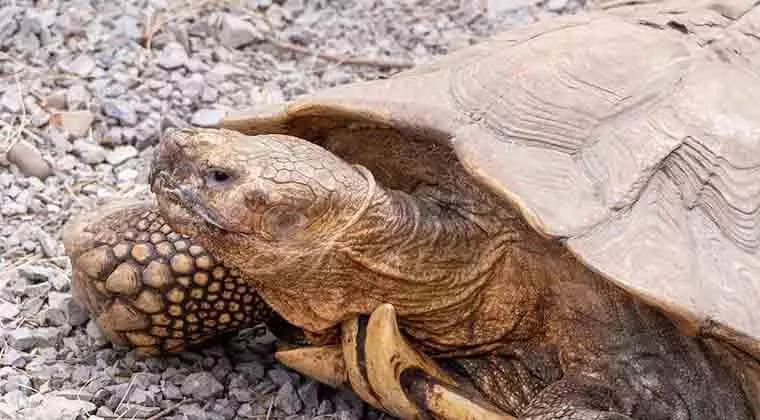Yes, tortoises can eat oranges. Oranges are a good source of vitamin C and fiber for tortoises, and they also contain calcium which is important for the development of healthy bones and shells. However, it is important to feed oranges in moderation as too much citrus fruit can cause digestive upset in some tortoises.
When feeding oranges to your pet, make sure to remove any seeds or pits from the orange slices before offering them as these could be hazardous if ingested by your reptile friend. Additionally, it’s best to only offer small amounts at a time so that you can monitor how well your pet tolerates this new food item.
What Foods Are Poisonous To Tortoises?
Tortoises are beloved pets that can live for decades and even centuries, but it is important to know what is poisonous to them. Many common foods including onions, garlic, avocado, chocolate, and rhubarb contain toxins that can be fatal if ingested by a tortoise. In addition to these foods, certain plants such as oleander, daffodils, and foxglove are toxic to the animals.
Even items commonly found around the home like rat bait or antifreeze should never be given to a tortoise as they could cause serious illness or death. It is also important not to overfeed your pet as this can lead to obesity-related health problems. If you think your tortoise may have eaten something dangerous it’s best to seek professional help immediately from an experienced vet who specializes in reptiles.
Can Sulcata Tortoises Eat Oranges?
Sulcata tortoises can eat oranges, but they should only be given as an occasional treat due to their high sugar content. Oranges are a great source of Vitamin C, so providing them in moderation can help supplement the Sulcata’s diet and promote overall health. As with any treat that is offered to your pet, it is important to ensure that you provide them in small portions and keep a close eye on how much your tortoise eats.
Can Hermann Tortoises Eat Oranges?
Hermann tortoises can eat oranges, but in moderation and only as a treat. The high sugar content of oranges can cause digestive upset for Hermann tortoises, so it’s important to provide them only sparingly or mixed with other fruits and vegetables. Additionally, the citrus acids may irritate their mouths if they’re not cut up into small pieces first.
If you choose to feed your Hermann tortoise orange slices, be sure to thoroughly wash the fruit beforehand to remove any pesticides or wax coating that may have been used on them.
What Fruit Is Safe For Tortoises?
There are a number of fruits that are usually regarded as safe and healthy for tortoises’ diets. Here are a few instances:
- Apples: Before giving your tortoise slices of an apple, remove the seeds and core.
- Berries: Blueberries, raspberries, blackberries, strawberries, and other berries can all be consumed in moderation.
- Melons: Tortoises frequently eat cantaloupe and watermelon.
- Grapes: To make them easier for the tortoise to chew, cut them into tiny pieces or give them a mild crush.
- Papaya: Cut up ripe papaya into small pieces and remove the seeds and skin.
- Figs: Give out skin-free, tiny, ripe figs.
- Kiwi: To prepare the kiwi for your tortoise, peel and cut it into manageable pieces.
As certain tortoises can have particular nutritional needs or sensitivities, always introduce new items gradually and in moderation. To make sure you’re feeding a balanced and adequate diet for your particular tortoise species, it’s always a good idea to speak with a reptile veterinarian or an expert knowledgeable about tortoise care.
Are Orange Peels Safe For Tortoises?
In general, tortoises shouldn’t be given orange peels. Orange peels have higher concentrations of essential oils and might be challenging for tortoises to digest, however, orange flesh is safe and can be provided as an occasional treat in modest amounts. Some reptiles may have intestinal discomfort or distress as a result of these oils.
To protect your tortoise’s safety and well-being, stick to giving them orange flesh only no peels. Always introduce new items gradually and watch your tortoise’s reaction before continuing. It is advised that you speak with a reptile veterinarian or a tortoise care specialist if you have any concerns regarding your turtle’s nutrition.
Can Desert Turtles Eat Oranges?
Desert turtles can eat oranges, but it is important to be aware of the nutritional benefits and drawbacks that come with this type of diet. Desert turtles require a balanced diet in order to stay healthy and strong, so while oranges may provide some beneficial vitamins and minerals such as vitamin C, their high sugar content can make it difficult for them to digest. When providing desert turtles with oranges it’s best to limit how much they consume or cut them into smaller pieces for easier digestion.
It’s also important to offer other foods such as leafy greens, vegetables, fruits like strawberries or melons, crickets, and mealworms in order to ensure that your turtle is getting all the nutrients it needs. As long as oranges are offered in moderation they can be a tasty treat for your desert turtle!
My tortoise is eating an Orange
Conclusion
Overall, it is clear that oranges are not suitable food for tortoises to eat. While some tortoises may appear to eat them without any negative effects, the acidic nature of the fruit can cause digestive issues and dietary imbalances in their diet. If you want to provide your pet tortoise with an occasional treat, there are plenty of other fruits and vegetables that they will enjoy more than oranges.
